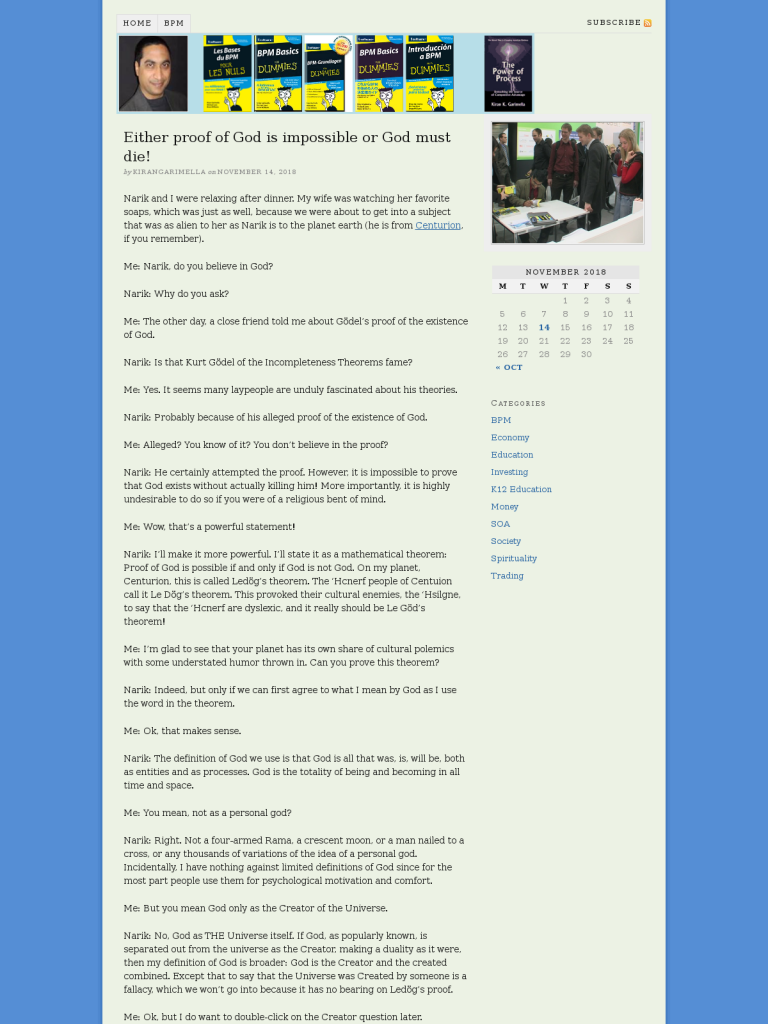Either proof of God is impossible or God must die!
Narik and I were relaxing after dinner. My wife was watching her favorite soaps, which was just as well, because we were about to get into a subject that was as alien to her as Narik is to the planet earth (he is from Centurion, if you remember).
Me: Narik, do you believe in God?
Narik: Why do you ask?
Me: The other day, a close friend told me about Gödel’s proof of the existence of God.
Narik: Is that Kurt Gödel of the Incompleteness Theorems fame?
Me: Yes. It seems many laypeople are unduly fascinated about his theories.
Narik: Probably because of his alleged proof of the existence of God.
Me: Alleged? You know of it? You don’t believe in the proof?
Narik: He certainly attempted the proof. However, it is impossible to prove that God exists without actually killing him! More importantly, it is highly undesirable to do so if you were of a religious bent of mind.
Me: Wow, that’s a powerful statement!
Narik: I’ll make it more powerful. I’ll state it as a mathematical theorem: Proof of God is possible if and only if God is not God. On my planet, Centurion, this is called Ledög’s theorem. The ‘Hcnerf people of Centuion call it Le Dög’s theorem. This provoked their cultural enemies, the ‘Hsilgne, to say that the ‘Hcnerf are dyslexic, and it really should be Le Göd’s theorem!
Me: I’m glad to see that your planet has its own share of cultural polemics with some understated humor thrown in. Can you prove this theorem?
Narik: Indeed, but only if we can first agree to what I mean by God as I use the word in the theorem.
Me: Ok, that makes sense.
Narik: The definition of God we use is that God is all that was, is, will be, both as entities and as processes. God is the totality of being and becoming in all time and space.
Me: You mean, not as a personal god?
Narik: Right. Not a four-armed Rama, a crescent moon, or a man nailed to a cross, or any thousands of variations of the idea of a personal god. Incidentally, I have nothing against limited definitions of God since for the most part people use them for psychological motivation and comfort.
Me: But you mean God only as the Creator of the Universe.
Narik: No, God as THE Universe itself. If God, as popularly known, is separated out from the universe as the Creator, making a duality as it were, then my definition of God is broader: God is the Creator and the created combined. Except that to say that the Universe was Created by someone is a fallacy, which we won’t go into because it has no bearing on Ledög’s proof.
Me: Ok, but I do want to double-click on the Creator question later.
Narik: Certainly. May I continue with my proof?
Me: Please do.
Narik: The next thing to understand is the whole idea of a proof itself. Without a clear understanding of what a proof means, the theorem is pointless.
Me: I assume that without understanding the nature of proof, religious people would be stuck?
Narik: Not so much as stuck but that their so-called proof is just wishful thinking.
Me: Ok then, what does ‘proof’ mean? Or, what does it mean to prove something?
Narik: That’s the real question. The concept of proof belongs to scientific epistemology.
Me: No need to be rude. What do you mean?
Narik: My friend, I wasn’t swearing. Epistemology is a branch of philosophy that deals with the methods of knowledge. The other, as it relates to knowledge, is ontology.
Me: I assume you’ll explain all these fancy terms.
Narik: Only if you stop interrupting. Ontology answers the questions, “What do I know? What are the relationships between the things that I know?” Epistemology answers the question, “How do I know what I know?”
Me: So, ontology is about the ‘what’ while epistemology is about the ‘how’.
Narik: Exactly. Scientific epistemology is about reason, logic, and proofs.
Me: So, when people try to prove the existence of God, they are using the methods of scientific epistemology?
Narik: Yes. Proofs don’t magically appear out of nowhere. They depend on a framework of axioms, logical inference, and conclusion.
Me: Are you saying that to prove God, one should start with axioms, since all theorems start that way?
Narik: Yes, of course.
Me: What would those axioms be?
Narik: Surprisingly enough, the actual axioms play no role in Ledög’s proof. This puzzled our theomaticians greatly.
Me: Theomaticians?
Narik: Sorry, theologians who use mathematics to prove or disprove theological statements.
Me: Our own Gödel was probably a matheologian, if I may coin my own term that means a mathematician who uses math in the aid of theology.
Narik: What would you call a mathematician who would use theology to prove or disprove mathematical theorems? But, let’s not digress. Back to our proof.
Me: My head’s spinning now.
Narik: That’s nothing, you just wait. So, it turns out that the actual axioms make absolutely no difference. Let’s say ‘G’ is a theorem of the existence of God. Such a theorem requires axioms, let’s call them alpha-G.
Me: We don’t care exactly what’s in the alpha-G set of axioms.
Narik: That’s right, we don’t. Starting with alpha-G, we need to have a set of rules of logic that when applied to the alpha-G set of axioms would lead to logically necessary statements.
Me: What would those rules of logic be? What do the logically necessary statements look like?
Narik: Surprisingly enough, it really does not matter. We don’t care what the axioms are and we don’t care what the logical inferences are. But what need to observe is that after a series of such logical progressions, a legitimate proof of the existence of God must end with the conclusion, “Therefore, God exists.”
Me: True enough. That’s what we wanted to prove.
Narik: Yes. But here’s the problem with all this: by using a proof of the existence of God, we just showed that the existence of God is logically necessitated. We said, “Because of this and this, because of such and such, God must exist.”
Me: Hmmm….I think I’m beginning to see the problem.
Narik: Let me make it explicit for you: If you prove that God must exist, you’ve just proven that God is logically dependent on a set of axioms and a system of logic. God cannot be the all-in-all. He is the logically necessitated result of something that is not God, namely the axioms and the system of logic.
Me: That’s a fine pickle to be in! Poor God! But what about Gödel’s proof?
Narik: Your earth mathematician took the easy way out. If you follow the proof, Gödel restricted the definition of God to a being that has only positive qualities. By that definition, Gödel’s God is not the God we agreed on; instead, He is a diminished God, certainly not what was, is, will be, and all aspects of being and becoming.
Me: What you are saying is that a proof of God is possible in some sense only if we restrict our God to something less than all that was, is, will be, and all being and becoming.
Narik: Yes! If you can prove that God exists, then you essentially kill God.
Me: That’s a bit gruesome!
Narik: Not to worry. God, as we agreed to define Him, is indestructible.
Me: But unprovable!
Narik: Unfortunately true. Some intellectually sophisticated religious people really understand this. For them, a proof of God would be an unmitigated disaster. It would mean that God is subject to the existence of something outside Himself, such as axioms and a logical system.
Me: What a conundrum!
Narik: Isn’t it, though? That’s why when the leader of a prominent Theomatic society, popularly known as the Epop, saw Ledög’s proof, he exclaimed, “DANG!”
Me: The way you said it, that sounded like an acronym. If so, what does it stand for?
Narik: ‘DANG’ stands for “Dang, Ain’t No God!”
Leave a Comment
You must be logged in to post a comment.








